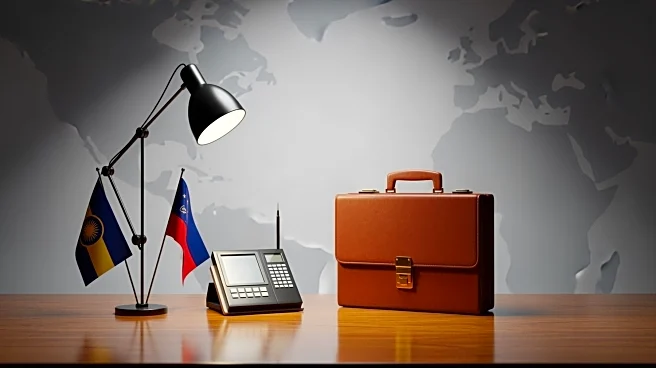What's Happening?
Ukrainian President Volodymyr Zelenskyy recently met with President Trump at the White House to discuss Ukraine's request for long-range Tomahawk missiles. The meeting focused on Ukraine's ongoing conflict with Russia and the need for military support.
Zelenskyy revealed in an interview that President Trump did not provide a definitive answer regarding the missile request, neither confirming nor denying the possibility of supplying the weapons. This discussion comes amid heightened tensions in Eastern Europe, where Ukraine seeks to bolster its defense capabilities against Russian aggression.
Why It's Important?
The potential provision of long-range missiles to Ukraine by the United States could significantly impact the balance of power in the region. If approved, these missiles would enhance Ukraine's military capabilities, potentially deterring further Russian advances. The decision also holds implications for U.S.-Russia relations, as it may be perceived as an escalation in support for Ukraine. For Ukraine, receiving such military aid would be a strategic advantage in its efforts to resist Russian occupation. Conversely, the lack of a clear commitment from President Trump leaves Ukraine in a state of uncertainty regarding its defense strategy.
What's Next?
The next steps involve continued diplomatic discussions between the U.S. and Ukraine, as well as potential negotiations with other NATO allies regarding military support. President Trump's indecision may prompt further dialogue within the U.S. administration and Congress about the implications of providing advanced weaponry to Ukraine. Additionally, Russia's response to these developments will be closely monitored, as any perceived increase in U.S. military support for Ukraine could lead to heightened tensions or retaliatory measures.
Beyond the Headlines
The ethical considerations of supplying weapons to conflict zones are complex, involving debates over the role of international arms sales in exacerbating or resolving conflicts. The decision also touches on broader geopolitical strategies, including the U.S.'s commitment to supporting democratic nations against authoritarian regimes. Long-term, the outcome of these discussions could influence U.S. foreign policy and its approach to international military aid.
















